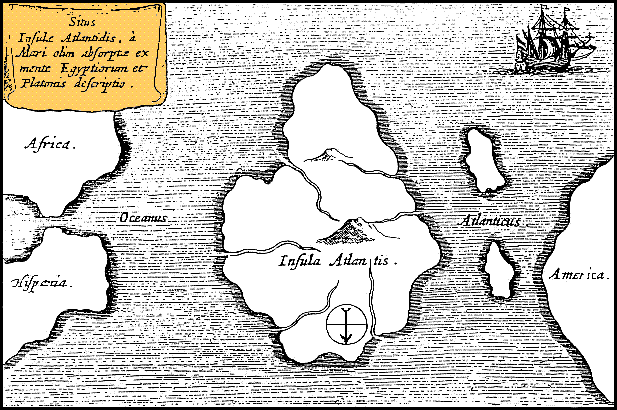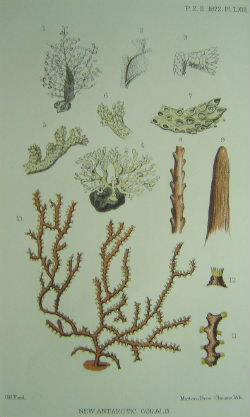Grey Cloud: In other words, it’s hearsay
By your defintion, over 99% of history is heresay. Does that mean it never happened?
Either you believe in history or you don't. I do; obviously you don't.
You seem to use the word ‘believe’ a lot. You also seem to see yourself as an expert at judging people. For the record I have studied history for over 45 years; I own well over 500 books on the subject; and I have a degree in Politics and Contemporary History. Yet again you make yourself look foolish.
"... I believe it is only fair to acknowledge an underlying and totally sincere scientific disbelief in the historical record." -- Ralph E. Juergens, engineer, 1972
Relevance, aside from him using the word 'believe'? What has the opinion of an engineer in the 1970s, and another Velikovskian(?), got to do with the way Plato uses the characters in his dialogues?
And why did you interpolate 'antarctica' into the passage?
Because Sonchis and Plato's description of Atlantis is a description of Antarctica.
Don’t you believe in geography? Plato describes Atlantis as lying beyond the Pillars of Hercules, as your own quote clearly states. Plato did not describe it as being south of Ethiopia. Are you calling Plato a liar? Plato also describes Atlantis as consisting of several concentric circles separated by a canal network. Does the Antarctic fit this description. And as StefanR has already mentioned, Plato states that Atlantis sank beneath the waves, yet the Antarctic is still there. Are you calling Sonchis and Plato liars again?
If that map is ancient Egyptian then why is it labelled in Latin and why is there a late-medieval European galleon in the top right-hand corner?
You have not provided any evidence.
For what? I’m not claiming that Atlantis was anywhere other than where Plato said it was.
Tautological facts don't require evidence. They are self-evident. Neith is the planet Venus. Since Athena is Neith, therefore Athena is Venus. Very basic logic.
I know what a tautology is but would like to know a ‘tautological fact’ is. I think you are getting mixed up with a syllogism with your example.
That the goddess Neith was viewed by the Egyptians as the goddess of Love does not automatically make her the planet Venus. Similarly, commonalities between Athene and Neith do not automatically mean that Athene is the planet Venus even if Neith is. The Indians view the planet Venus as a male and he is not the god of Love. Did they get that wrong or can you explain it?
Similarly, the quote from Diogenes makes no mention of a goddess or goddesses.
Are you saying that Lucifer and Vesper are mortals? Evidence please.
You seem to struggle to follow plain English and common sense. I am saying that the passage you provided in no way mentions a goddess or goddesses. What it does do is to give two epithets for the same planet (Venus). Lucifer and Vesper are neither mortal nor immortal, they are Latin words (adjectives(?)) describing the behaviour of a planet. As I’ve mentioned before, your own quotes don’t even support your assertions, as in this extract from the Pliny quote:
“For when it precedes the day and rises in the morning, it receives the name of Lucifer, as if it were another sun, hastening on the day. On the contrary, when it shines in the west, it is named Vesper, as prolonging the light, and performing the office of the moon”.
He explains exactly what Lucifer and Vesper mean and, note, he uses the word ‘it’, not ‘she’ – he is talking about a planet not a goddess.
If Hephaistos is the planet Mercury, then how do you explain the fact that Hephaistos is always depicted as lame or crippled? And, while you are at it, why Hermes as the messenger of Zeus can go anywhere?
Possibly Hermes is the name of Mercury when it's being tossed around from planet to planet; Hephaistos when it is in it's present orbit.
Do you ever think anything through? If that is the case then why did even the latter ancient Greeks call the planet Mercury and not Hephaistos, given that it had stopped being ‘tossed around from planet to planet’, another assertion for which you have no evidence.
Just to give you, and Moses, some idea of the depth and subtlety of Greek thought on the gods, here are two footnotes from Thomas Taylor’s translation of Critias:
* As, according to the theology of Plato, there is not one father of the universe only, one providence, and one divine law, but many fathers subordinate to the one first father, many administrators of providence posterior to, and comprehended in, the one universal providence of the demiurgus of all things, and many laws proceeding from one first law, it is necessary that there should be different allotments, and a diversity of divine distribution. The allotment, however, of a divine nature is a government exempt from all passivity, and a providential energy about the subjects of its government.
This is what I meant, in an earlier post, about Zeus being Universal Mind.
* Vulcan is that divine power which presides over the spermatic and physical reasons, or productive principles, which the universe contains: for whatever Nature accomplishes by verging towards bodies, Vulcan performs in a divine and exempt manner, by moving Nature, and using her as an instrument in his own proper fabrication; since natural heat has a Vulcanian characteristic, and was produced by Vulcan for the purpose of fabricating a corporeal nature. Vulcan, therefore, is that power which perpetually presides over the fluctuating nature of bodies; and hence, says Olympiodorus, he operates with bellows, which occultly signifies his operating in natures. But by earth we must understand matter, which was thus symbolically denominated by the ancients, as we learn from Porphyry de Antr. Nymph.
By Minerva we must understand the summit of all those intellectual natures that reside in Jupiter, the artificer of the world: or, in other words, she is that deity which illuminates all mundane natures with intelligence.
The Athenians, therefore, who are souls of a Minerval characteristic, may be very properly said to be the progeny of Vulcan and the Earth, because Vulcan, who perpetually imitates the intellectual energy of Minerva in his fabrication of the sensible universe, imparts to them through this imitation those vehicles, and those spermatic reasons, through which in conjunction with matter they become inhabitants of this terrestrial abode.
Both passages from The Works of Plato in Five Volumes, translated by Thomas Taylor, Vol II, p588.
A somewhat less simplistic interpretation than your Vulcan = Mercury and Minerva = Venus. Feel free to explain why Taylor is wrong.
That’s according to the Pelasgians.
There are no Pelasgian works that survived antiquity. Evidence please.
I got that list from my own personal (shambolic) notes but where it originated I have no idea. While no Pelasgian material has come down to us, we still have references in other ancient works. Wherever that list originated it will have been a source which I had judged to be at least worth considering. If you knew your Plato and/or your Homer you would realise that the list could be interpreted to support some of your assertions. But you don’t…
So an angel is an ET?
Correct.
There are tens of thousands of people in Manchester who believe that MCFC will win some silverware this season. I’ll believe it when I see it.
"I wonder if what we now call the UFO reality, and what the Bible calls angels of God, are not the same reality. If this is true, then we humans have a lot of thinking to do." -- Barry H. Downing, author, 1997
"I believe it is time we explored the possibility that UFOs carry the angels of God." -- Barry H. Downing, author, 1997
I seem to recall that in the 70s, on the back of v. Daniken’s books, there were a raft of books exploring this very topic. They all sank faster than Atlantis.
"The ancients possessed a plasma cosmology and physics themselves, and from laboratory experiments, were well familiar with the patterns exhibited by Peratt's petroroglyphs." -- Joseph P. Farrell, author, 2007
Laboratory experiments? Have ancient laboratories been unearthed? That ‘the ancients were well familiar with the patterns exhibited by Peratt’s petroglyphs’ is evidenced by that fact that they were drawn by the ancients and not Peratt. ‘Well familiar’ – what sort of English is that? He sounds like a British teenager (I do know who he is). One can also see many similar drawings been done today by young children, none of whom have ever heard of plasma or laboratories.


